115 books about Gays and 9
start with G
115 books about Gays and 9
115 books about Gays
9 start with G start with G
9 start with G start with G
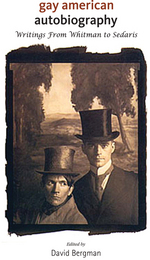
Gay American Autobiography
Writings from Whitman to Sedaris
David Bergman
University of Wisconsin Press, 2009
In the first anthology to survey the full range of gay men’s autobiographical writing from Walt Whitman to the present, Gay American Autobiography draws excerpts from letters, journals, oral histories, memoirs, and autobiographies to provide examples of the best life writing over the last century and a half.
Volume editor David Bergman guides the reader chronologically through selected writings that give voice to every generation of gay writers since the nineteenth century, including a diverse array of American men of African, European, Jewish, Asian, and Latino heritage. Documenting a range of life experiences that encompass tattoo artists and academics, composers and drag queens, hustlers and clerks, it contains accounts of turn-of-the-century transvestites, gay rights activists, men battling AIDS, and soldiers attempting to come out in the army. Each selection provides important insight on the wide spectrum of ways gay men have defined and lived their lives, highlighting how self-awareness changes an author’s experience.
The volume includes an introduction by Bergman and headnotes for each of the nearly forty entries. Bringing many out-of-print and hard-to-find works to new readers, this challenging and comprehensive anthology chronicles American gay history and life struggles over the course of the past 150 years.
Volume editor David Bergman guides the reader chronologically through selected writings that give voice to every generation of gay writers since the nineteenth century, including a diverse array of American men of African, European, Jewish, Asian, and Latino heritage. Documenting a range of life experiences that encompass tattoo artists and academics, composers and drag queens, hustlers and clerks, it contains accounts of turn-of-the-century transvestites, gay rights activists, men battling AIDS, and soldiers attempting to come out in the army. Each selection provides important insight on the wide spectrum of ways gay men have defined and lived their lives, highlighting how self-awareness changes an author’s experience.
The volume includes an introduction by Bergman and headnotes for each of the nearly forty entries. Bringing many out-of-print and hard-to-find works to new readers, this challenging and comprehensive anthology chronicles American gay history and life struggles over the course of the past 150 years.
Finalist, Lambda Book Award for LGBT Anthology, Lambda Literary Foundation
[more]
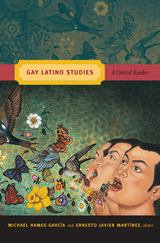
Gay Latino Studies
A Critical Reader
Michael Hames-García and Ernesto Javier Martínez, eds.
Duke University Press, 2011
The authors of the essays in this unique collection explore the lives and cultural contributions of gay Latino men in the United States, while also analyzing the political and theoretical stakes of gay Latino studies. In new essays and influential previously published pieces, Latino scholars based in American studies, ethnic studies, history, performance studies, and sociology consider gay Latino scholarly and cultural work in relation to mainstream gay, lesbian, and queer academic discourses and the broader field of Chicano and Latino studies. They also critique cultural explanations of gay Latino sexual identity and behavior, examine artistic representations of queer Latinidad, and celebrate the place of dance in gay Latino culture. Designed to stimulate dialogue, the collection pairs each essay with a critical response by a prominent Latino/a or Chicana/o scholar. Terms such as gay, identity, queer, and visibility are contested throughout the volume; the significance of these debates is often brought to the fore in the commentaries. The essays in Gay Latino Studies complement and overlap with the groundbreaking work of lesbians of color and critical race theorists, as well as queer theorists and gay and lesbian studies scholars. Taken together, they offer much-needed insight into the lives and perspectives of gay, bisexual, and queer Latinos, and they renew attention to the politics of identity and coalition.
Contributors. Tomás Almaguer, Luz Calvo, Lionel Cantú,, Daniel Contreras, Catriona Rueda Esquibel, Ramón García, Ramón A. Gutiérrez, Michael Hames-García, Lawrence La Fountain-Stokes, María Lugones, Ernesto J. Martínez, Paula M. L. Moya, José Esteban Muñoz, Frances Negrón-Muntaner, Ricardo L. Ortiz, Daniel Enrique Pérez, Ramón H. Rivera-Servera, Richard T. Rodríguez, David Román, Horacio N. Roque Ramírez, Antonio Viego
[more]

Gay Lives
Homosexual Autobiography from John Addington Symonds to Paul Monette
Paul Robinson
University of Chicago Press, 1999
In his autobiography, John Addington Symonds relates a glorious night of passion, in which he and his lover "lay covered from the cold in bed, tasting the honey of softly spoken words and the blossoms of lips pressed on lips." Christopher Isherwood's first autobiography, on the other hand, was far less direct; he wrote a second autobiography in part because the first was "not truly autobiographical" in that "the author conceals important facts about himself." These contradictions, evasions, and explicit sexual details of the life stories of fourteen men form Gay Lives, a revealing account of homosexual autobiography.
Paul Robinson reads the memoirs of French, British, and American gay authors—André Gide, Quentin Crisp, and Martin Duberman, among others—through the prism of sexual identity, asking fascinating questions about homosexuality and its relation to literary form. How did these authors discover their sexual identity? Did they embrace it or reject it? How did they express often conflicted desires in their words, which ranged from defiant and brutally frank to ambiguous and abstract? Robinson considers the choices each made—as a man and an author—to accommodate himself to society's homophobia or live in protest against his oppression.
Despite the threads that connect these stories, Gay Lives refutes the notion that there is a typical homosexual "career" by showing that gay men have led wildly dissimilar lives—from the exuberant to the miserable—and that they have found no less dissimilar meanings in those lives.
Paul Robinson reads the memoirs of French, British, and American gay authors—André Gide, Quentin Crisp, and Martin Duberman, among others—through the prism of sexual identity, asking fascinating questions about homosexuality and its relation to literary form. How did these authors discover their sexual identity? Did they embrace it or reject it? How did they express often conflicted desires in their words, which ranged from defiant and brutally frank to ambiguous and abstract? Robinson considers the choices each made—as a man and an author—to accommodate himself to society's homophobia or live in protest against his oppression.
Despite the threads that connect these stories, Gay Lives refutes the notion that there is a typical homosexual "career" by showing that gay men have led wildly dissimilar lives—from the exuberant to the miserable—and that they have found no less dissimilar meanings in those lives.
[more]
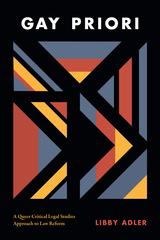
Gay Priori
A Queer Critical Legal Studies Approach to Law Reform
Libby Adler
Duke University Press, 2018
Libby Adler offers a comprehensive critique of the mainstream LGBT legal agenda in the United States, showing how LGBT equal rights discourse drives legal advocates toward a narrow array of reform objectives that do little to help the lives of the most marginalized members of the LGBT community.
[more]
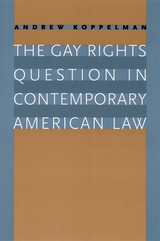
The Gay Rights Question in Contemporary American Law
Andrew Koppelman
University of Chicago Press, 2002
The gay rights question is whether the second-class legal status of gay people should be changed. In this book Andrew Koppelman shows the powerful legal and moral case for gay equality, but argues that courts cannot and should not impose it.
The Gay Rights Question in Contemporary American Law offers an unusually nuanced analysis of the most pressing gay rights issues. Does antigay discrimination violate the Constitution? Is there any sound moral objection to homosexual conduct? Are such objections the moral and constitutional equivalent of racism? Must state laws recognizing same-sex unions be given effect in other states? Should courts take account of popular resistance to gay equality? Koppelman sheds new light on all these questions. Sure to upset purists on either side of the debate, Koppelman's book criticizes the legal arguments advanced both for and against gay rights. Just as important, it places these arguments in broader moral and social contexts, offering original, pragmatic, and workable legal solutions.
The Gay Rights Question in Contemporary American Law offers an unusually nuanced analysis of the most pressing gay rights issues. Does antigay discrimination violate the Constitution? Is there any sound moral objection to homosexual conduct? Are such objections the moral and constitutional equivalent of racism? Must state laws recognizing same-sex unions be given effect in other states? Should courts take account of popular resistance to gay equality? Koppelman sheds new light on all these questions. Sure to upset purists on either side of the debate, Koppelman's book criticizes the legal arguments advanced both for and against gay rights. Just as important, it places these arguments in broader moral and social contexts, offering original, pragmatic, and workable legal solutions.
[more]
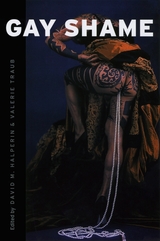
Gay Shame
Edited by David M. Halperin and Valerie Traub
University of Chicago Press, 2009
Ever since the 1969 Stonewall Riots, “gay pride” has been the rallying cry of the gay rights movement and the political force behind the emergence of the field of lesbian and gay studies. But has something been lost, forgotten, or buried beneath the drive to transform homosexuality from a perversion to a proud social identity? Have the political requirements of gay pride repressed discussion of the more uncomfortable or undignified aspects of homosexuality?
Gay Shame seeks to lift this unofficial ban on the investigation of homosexuality and shame by presenting critical work from the most vibrant frontier in contemporary queer studies. An esteemed list of contributors tackles a range of issues—questions of emotion, disreputable sexual histories, dissident gender identities, and embarrassing figures and moments in gay history—as they explore the possibility of reclaiming shame as a new, even productive, way to examine lesbian and gay culture.
Accompanied by a DVD collection of films, performances, and archival imagery, Gay Shame constitutes nothing less than a major redefinition and revitalization of the field.
[more]
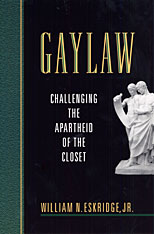
Gaylaw
Challenging the Apartheid of the Closet
William N. Eskridge Jr.
Harvard University Press, 1999
This book provides a comprehensive analysis of the legal issues concerning gender and sexual nonconformity in the United States. Part One, which covers the years from the post-Civil War period to the 1980s, is a history of state efforts to discipline and punish the behavior of homosexuals and other people considered to be deviant. During this period such people could get by only at the cost of suppressing their most basic feelings and emotions. Part Two addresses contemporary issues. Although it is no longer illegal to be openly gay in America, homosexuals still suffer from state discrimination in the military and in other realms, and private discrimination and violence against gays is prevalent. William Eskridge presents a rigorously argued case for the "sexualization" of the First Amendment, showing why, for example, same-sex ceremonies and intimacy should be considered "expressive conduct" deserving the protection of the courts. The author draws on legal reasoning, sociological studies, and history to develop an effective response to the arguments made in defense of the military ban. The concluding part of the book locates the author's legal arguments within the larger currents of liberal theory and integrates them into a general stance toward freedom, gender equality, and religious pluralism.
[more]
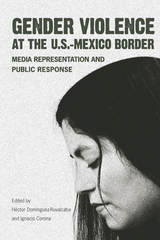
Gender Violence at the U.S.–Mexico Border
Media Representation and Public Response
Edited by Héctor Domínguez-Ruvalcaba and Ignacio Corona
University of Arizona Press, 2012
The U.S.-Mexico border is frequently presented by contemporary media as a violent and dangerous place. But that is not a new perception. For decades the border has been constructed as a topographic metaphor for all forms of illegality, in which an ineffable link between space and violence is somehow assumed. The sociological and cultural implications of violence have recently emerged at the forefront of academic discussions about the border. And yet few studies have been devoted to one of its most disturbing manifestations: gender violence. This book analyzes this pervasive phenomenon, including the femicides in Ciudad Juárez that have come to exemplify, at least for the media, its most extreme manifestation.
Contributors to this volume propose that the study of gender-motivated violence requires interpretive and analytical strategies that draw on methods reaching across the divide between the social sciences and the humanities. Through such an interdisciplinary conversation, the book examines how such violence is (re)presented in oral narratives, newspaper reports, films and documentaries, novels, TV series, and legal discourse. It also examines the role that the media have played in this process, as well as the legal initiatives that might address this pressing social problem.
Together these essays offer a new perspective on the implications of, and connections between, gendered forms of violence and topics such as mechanisms of social violence, the micro-social effects of economic models, the asymmetries of power in local, national, and transnational configurations, and the particular rhetoric, aesthetics, and ethics of discourses that represent violence.
[more]
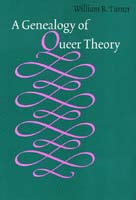
Genealogy Of Queer Theory
William Turner
Temple University Press, 2000
Who are queers and what do they want? Could it be that we are all queers? Beginning with such questions, William B. Turner's lucid and engaging book traces the roots of queer theory to the growing awareness that few of us precisely fit standard categories for sexual and gender identity.
Turner shows how Michal Foucault's work contributed to feminists' investigations into the ways that power relates to identity. In the last decades of the twentieth century, feminists were the first to challenge the assumption that a claim to universal identity -- the white male citizen -- should serve as the foundation of political thought and action. Difference matters. Race, ethnicity, class, gender, and sexuality interact, producing a wide array of identities that resist rigid definition and are mutable. By understanding the notion of transhistorical categories -- woman, man, homosexual, and so forth -- feminist and gay male scholars launched queer theoretical work as a new way to think about the politics of gender and sexuality.
A Geneology of Queer Theory probes the fierce debates among scholars and activists, weighing the charges that queer readings of texts and identity politics do not constitute and might inhibit radical social change. Written by a historian, it considers the implications of queer theory for historical inquiry and the distinction between philosophy and history. As such, the book will interest readers of gay/lesbian/bisexual/transgender studies, intellectual history, political theory, and the history of gender/sexuality.
Turner shows how Michal Foucault's work contributed to feminists' investigations into the ways that power relates to identity. In the last decades of the twentieth century, feminists were the first to challenge the assumption that a claim to universal identity -- the white male citizen -- should serve as the foundation of political thought and action. Difference matters. Race, ethnicity, class, gender, and sexuality interact, producing a wide array of identities that resist rigid definition and are mutable. By understanding the notion of transhistorical categories -- woman, man, homosexual, and so forth -- feminist and gay male scholars launched queer theoretical work as a new way to think about the politics of gender and sexuality.
A Geneology of Queer Theory probes the fierce debates among scholars and activists, weighing the charges that queer readings of texts and identity politics do not constitute and might inhibit radical social change. Written by a historian, it considers the implications of queer theory for historical inquiry and the distinction between philosophy and history. As such, the book will interest readers of gay/lesbian/bisexual/transgender studies, intellectual history, political theory, and the history of gender/sexuality.
[more]
READERS
Browse our collection.
PUBLISHERS
See BiblioVault's publisher services.
STUDENT SERVICES
Files for college accessibility offices.
UChicago Accessibility Resources
home | accessibility | search | about | contact us
BiblioVault ® 2001 - 2024
The University of Chicago Press









